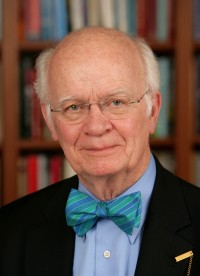Unchanging faith? America's God: America's God
"Wonderfully prolific” and “as fine a historian as America now boasts” is how reviewer Eugene D. Genovese characterizes Wheaton College professor Mark Noll (New Republic, September 8 & 15). He refers to Noll’s “magnum opus,” America’s God: From Jonathan Edwards to Abraham Lincoln as “magisterial,” “rich,” “learned,” “deeply thoughtful,” “incisive,” “readable,” “accessible,” “extraordinary,” “bold,” “gracious,” “scholarly” and “accurate.” We hope the Bancroft, Prescott, National Book Award and Pulitzer prize people are paying attention.
Noll is prime in that generation of evangelical historians who are now leaders in the profession. But Genovese, an ex-Marxist now friendly to religion (though, I believe, he remains an “outsider” at the side of his professing spouse, noted historian Elizabeth Fox-Genovese), also criticizes Noll’s book. His reasons make the review interesting and help occasion my comment. Like many non-Christians who chronicle and take sides in the conflicts within Christian communities, Genovese castigates those who accept any kind of dynamic and developmental views of Christian faith, church and tradition.
He regards the pre–Civil War Calvinist southern Presbyterians—who upheld their version of biblical literalism, insisting on “original sin” and biblical justifications for slavery—as defenders of normative Christianity. Over against this normative Christianity, the northern church leaders and all moderates and liberals were heretics.
True, the improvisations of some northern liberals were departures from the faith they had known, and they did and do present problems to the neo-orthodox (Genovese cites H. Richard Niebuhr) and many others. But the reviewer lumps northern pro-Union, antislavery Protestants together as deviants from the One True Faith.
Genovese particularly takes issue with Noll for saying positive things about some of Abraham Lincoln’s statements about “America’s God.” He pronounces the Confederate Calvinists right, Lincoln wrong—as is Noll in finding faithful and creative insights among the antislavery arguments. Genovese quotes the utterly typical Reverend Ferdinand Jacobs of Charleston: “If the scriptures do not justify slavery, I know not what they do justify. If we err in maintaining this relation, I know not when we are right—truth then has parted her usual moorings and floated off into an ocean of uncertainty.”
Genovese reminds us: “Nothing in the Old Testament condemns slavery,” God blessed the slave-owning patriarchs, and “neither Jesus nor the Apostles uttered a word against slavery, much less declared it sinful.” The southerners were scripturally correct. They “demonstrated that the Bible sanctioned slavery without racial referent.” But I know of no orthodox, southern, Presbyterian, Calvinist leader or other Christian figure of note today who promotes biblical “justifications” and “blessings” of slavery.
Some generations from now a historian writing on “America’s God” will have to tell the story of current controversies in church and nation—for example, the conflict over homosexuality. If the churches in our century find what Noll calls “hermeneutical” ways to relate literalism and legalism to this new situation, as the northern clergy did in the case of slavery, no doubt a spiritual descendant of Genovese can be expected to insist that the old orthodoxy was wholly right. “Both sides read the same Bible, and pray to the same God,” Lincoln said then, and the same thing is true now. But where is the Lincoln who will help the two sides “bind up” each other’s wounds?






